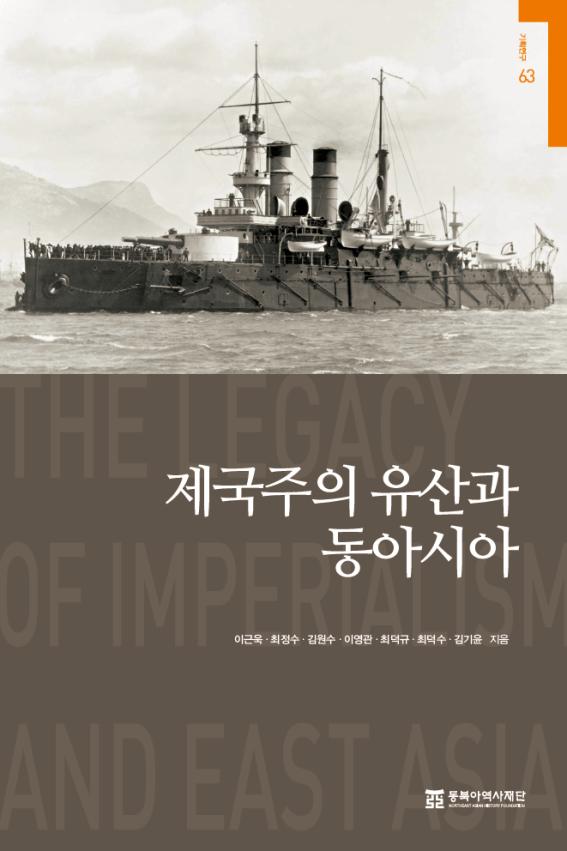Publication
- Date2016.01.14
- Hit551

1. All rights reserved by the Northeast Asian History Foundation
2. No part of the files on this website may be reproduced and/or copied in any way, shape, or form without permission.
Title: The Legacy of Imperialism and East Asia
Authored by Lee Geun-wook (李根旭), Choi Jeong-su (崔正洙), Kim Won-su (金元洙), Lee Young-gwan (李英官), Choi Deok-kyu (崔悳圭), Choi Deok-su (崔德壽), and Kim Gi-yun (金基潤)
ISBN 978-89-6187-355-0 93910
Tensions over historical issues in East Asia today may be attributed to, among others, the historical legacy of the era of imperialism. East Asia suffered from the expansion policies of the Western imperialist powers once they began vying for control over the region. Therefore, the history of the era of imperialism is an important topic to research in a systematic and comprehensive manner if we are to ease tensions over historical issues and build a peaceful and prosperous East Asia. This book examines the global spread of imperialism from the late 19th to early 20th centuries and the resulting changes in the world of East Asia. Significantly, the book serves as the impetus to kick-start a systematic review of the logic behind the imperialist powers' expansion into East Asia and related historical facts.
Table of Contents
Overseas Expansion and State Action
Imperialism in the Eyes of International Politics
I. Imperialism: Concept and Research
1. Various Concepts: Imperialism, Colonialism, and Overseas Expansion
2. Empire and Imperialism
II. Imperialism in International Politics: Overseas Expansion and Decisive Factors Affecting It
1. International Anarchy
2. Why Do States Expand?
3. Theory of Imperialism: Lenin and Beyond
III. Defensive Overseas Expansion: Discussion in terms of International Politics
1. Security Dilemma and Defensive Overseas Expansion
2. Domestic Politics and Defensive Overseas Expansion
IV. The Balance Sheet of Imperialism: Is Overseas Expansion a Gain or Loss?
V. Colonialism: Various Forms of Imperialism
VI. Contribution of the Perspective of International Politics
The Grand Strategy and the 'Containment Strategy toward Russia' by Alfred T. Mahan with Focus on The Problem of Asia: Its Effect Upon International Politics
I. Introduction
II. On the 'Expected Emergence of the Combined Empire of Russia and China' and the Importance of Asia
III. On the Containment of Russia and the Alliance of the Four Sea Powers
1. On the Containment of Russia
2. International Organization for the Alliance of the Four Sea Powers
IV. On the U.S.'s Diplomatic and Military Reforms
1. Liquidation of Isolationism
2. Revision of the Monroe Doctrine
3. On Military Reform and Building a Blue-Water Navy
V. Conclusion
Sir Halford John Mackinder and British Imperialism
in relation to Britain's Foreign Policy in the Edwardian Period
I. Introduction
II. Mackinder's Profile
III. The Geographical Pivot of History (1904) by Mackinder
IV. Britain's Geopolitical Status and International Relations in the Early 20th Century
V. Diversification of Britain's Foreign Policy in the Era of Edward VII
VI. Conclusion
German Emperor Wilhelm II's Colonial Policy and East Asia
I. Introduction: The Background of Competition for Colonies and the Birth of the German Empire
II. The History of German Colonies and the Birth of the German Empire
III. Wilhelm II's Ascent to the Throne and the German Empire's Colonial Policy
IV. The German Empire's World Policy and East Asia
V. Conclusion
Russia's Naval Policy and Crises on the Northern and Southern Borders of the Korean Peninsula (1885-1887)
With Focus on the Geomundo Incident and China-Korea Boundary Talks
I. Introduction
II. Showdown between British and Russian Navies and a Connection between the Korean Peninsula and the Balkan Peninsula
III. The Korea Strait vs. The Turkish Straits: Geomundo and Bulgarian Crisis
IV. British-Russian Policy of Compromise and the Resolution of Crises on the Northern and Southern Borders of the Korean Peninsula
V. Conclusion
Yamagata Arimoto's Theory of Imperialism and Korea
I. Introduction: Yamagata was not an expansionist?
II. The Formation and Development of Yamagata's Theory of Imperialism
1. On Armament Expansion in the Periods of the 1882 Mutiny and 1884 Coup
2. Establishment of the Meiji Imperial Diet and the ‘Theory of Diplomatic Scheme’
3. The Sino-Japanese War and the Theory of Colonization of Korea
4. The Russo-Japanese War and the Theory of Post-War Management (of Korea)
5. The Theory of Colonial Policy Before and After the ‘Annexation of Korea’
III. Conclusion
Imperialism and Science
Reading Colonial Science
I. Science Spreading from the Empire to the Colony
II. Science as a Tool of Control and Subjugation
III. Science as Cultural Authority
IV. Science Monopolized Through Hybridization, Translation, and Negotiation
V. Science Described as a Network in Globalization
VI. Science Created in a Mix of Circulating Elements
